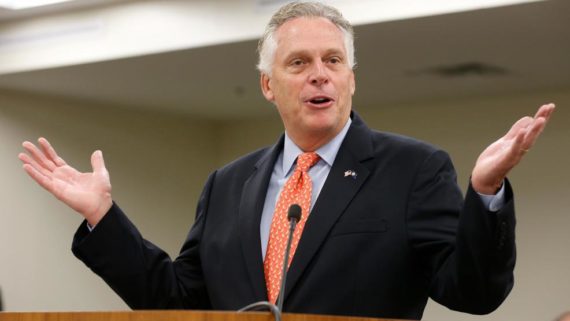
Former Virginia Gov. Terry McAuliffe and Virginia Attorney General Mark Herring dropped the ball in handling of inmate’s horrific death
(Thank you for your support. My blog reached an average of 191,000 readers nationally last month.)
(2-4-19) Richmond Virginia attorney Mark J. Krudys has accomplished what local, state and federal officials declined to do.
He has made the Hampton Roads Regional Jail, its former in-house health care provider, and the state accountable for the horrific death of Jamycheal Mitchell, the 24-year-old Virginian who suffered a heart attack in 2015 after being starved while waiting 101 days in jail to be sent to a state mental hospital. Mitchell had a serious mental illness and was jailed after allegedly stealing $5.05 of snacks from a convenience store.
Krudys agreed to settle the wrongful death suit that he’d filed on behalf of the Mitchell family for $3 million. None of those involved admitted wrongdoing but the size of the settlement in conservative Virginia speaks volumes.
Sadly, two prominent Virginia politicians have escaped unscathed.
Former Virginia Governor Terry McAuliffe, who reportedly is considering a run for president, and Virginia Attorney General Mark Herring, who is running for governor in 2021, should be publicly pillared.
On August 19, 2015, Mitchell’s lifeless body was found in his cell. The jail conducted its own internal investigation and, not surprisingly, declared itself innocent. Two state agencies were responsible for conducting investigations: the state Behavioral Health and Developmental Services (DBHDS), which oversees state hospitals, and the Office of State Inspector General.
Let’s begin with the IG’s office whose executive director at that time was June Jennings. Her handling of the IG probe was so questionable that the Virginia Senate voted overwhelmingly to oust her after state lawmakers, mental health advocates and civil rights organizations claimed her office had failed to explain why Mitchell was allowed to waste away in plain sight of guards and nurses, losing some 40 pounds while incarcerated. 
A whistleblower inside the IG’s office and two contractors filed a 15-page complaint about the IGs’ handling of Mitchell’s case. One of their accusations was that Jennings and her staff lied to me.
How did then Gov. McAuliffe respond?
His office rejected the three whistleblowers’ allegations without bothering to interview any of them. Then he gave Jennings a different high paying job inside his administration.
How did Attorney General Herring handle himself during the Mitchell fiasco?
I began filing freedom of information requests when it appeared to me that the IG’s office and DBHDS were taking a long time to release reports about Mitchell’s death. A spokesperson for the IG’s office told me that it couldn’t finish its probe until the DBHDS released the results of its investigation. On March 21, 2016 – some eight months after Mitchell’s death – the DBHDS released its findings and on April 5, 2016 the state IG issued its report.
That was when I noticed a curious, one line statement in the IG report. It disclosed that the DBHDS had finished its investigation in December 2015. It wasn’t made public for three additional months because, the report noted, the results of the DBHDS investigation were “forwarded to the (DBHDS) Assistant Commissioner for Forensic Services for review and then the Office of the Attorney General.”
If you examine a 2016 calendar, you’ll see that the first day of Virginia’s legislative session began in January and adjourned on March 12.
That’s the exact time period when the DBHDS report about Mitchell was being “reviewed.” It was released later in March after legislators had gone home. A coincidence? Or politics?
The Richmond Times Dispatch published this headline and story on April 25, 2016:
Attorney general’s office intervened in investigation into Jamycheal Mitchell’s death
Another agency conducting a separate investigation into Mitchell’s death, the Office of the State Inspector General, also did not interview the court’s employees because it believed — based on secondhand information it said it received from the jail where Mitchell died — that the Attorney General’s Office would block its access.
The McAuliffe administration’s investigation of Mitchell’s death was so incomplete that the U.S. Justice Department launched its own probe .
Some will complain about Krudys’ lawsuit. But when state’s officials fail to do their job, a civil lawsuit is the only way to seek justice.
NaphCare, the company responsible for providing medical care to inmates, must pay $1.8 million of the $3 million settlement. Unfortunately, taxpayers ultimately will be stuck with the picking up the jail’s $875,000 tab and the state’s $325,000 obligation. Once attorneys take their cut, the family will receive $1.9 million.
Voters should consider how McAuliffe and Herring dealt with Mitchell’s death when casting ballots in the future elections.



